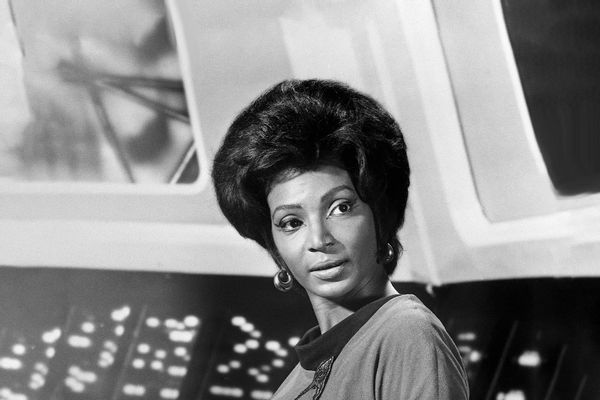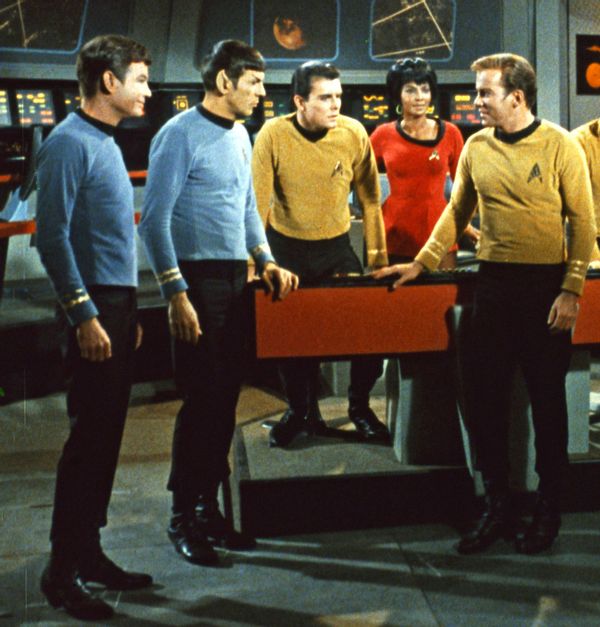
Let me be the first to say that I took Nichelle Nichols, and her groundbreaking role as Lt. Uhura on "Star Trek," for granted.
Never did I lack appreciation for Nichols' historic significance or that of her role as the U.S.S. Enterprise's communications officer. Let's be clear about that. What I'm referring to is the realization that thanks to early imprinting on my brain, I have never lived in a time where Lt. Nyota Uhura didn't exist, let alone one where I didn't think it was possible to follow her path through the cosmos.
Uhura is central to the Enterprise's operations, whether as the person reaching into the unknown or maintaining a connection between a mission's landing party and the ship.
Only when I was much older and looking at the world through a more critical lens did I notice Uhura's and Nichols' elegant exceptionality in the TV universe. That she was there at all matters greatly, along with the fact that during the 18 years that transpired between the end of the original series and "Star Trek: The Next Generation," she stood alone.
Nichols died on Saturday, July 30. She was 89 years old. In the hours after her death was announced, versions of the often-recounted story of her exchange with Martin Luther King, Jr. at an NAACP event circulated. As the story goes, near the end of the first season of "Star Trek," she was offered a role in a Broadway-bound stage production. "I was a singer on stage long before I was an actress, and Broadway was always a dream to me," Nichols' explained in an archived Reddit thread where she answered fans' questions. "I was ready to leave 'Star Trek' and pursue what I'd always wanted to do."
At the encouragement of "Star Trek" creator Gene Roddenberry, Nichols took the weekend to think about her decision to quit. That same weekend she met King, who informed the actor that he was a Trekker and that "Star Trek" was the only show he allowed his children to stay up and watch.
When she mentioned she was set to leave the show, Nichols recalls King's face growing solemn. "You cannot. You cannot," he insisted, according to her recollection of their interaction. ". . .'Don't you understand what this man has achieved? . . . For the first time on television, we will be seen as we should be seen every day: As intelligent, quality, beautiful people who can sing, dance, but who can go to space. Who can be lawyers, who can be teachers, who can be professors – who are, in this day, and yet you don't see it on television until now."
There's a tendency to share portions of Dr. King's quotes that affirm his legacy as a dreamer, and in the context of Nichols' death, that proved true yet again.
And while Nichols has told various versions of that story over the years, her retelling of the part that came after King's hopeful, uplifting encouragement, which she shared in an interview for the Archive of American Television, is equally as important. This is where King the realist assigned Nichols' purpose to her.
"Gene Roddenberry has opened a door for the world to see us," Nichols remembers King saying. "If you leave, that door can be closed. Because, you see, your role is not a Black role. And it's not a female role. He can fill it with anything. Including an alien."
"And at that moment, the world tilted for me," Nichols finished, "and I knew that I was something else, that the world was not the same."
I assumed women like Uhura – women who looked like me – had always been on the bridge of starships.
Being a child of the '80s, my first interactions with "Star Trek" were through syndicated reruns. Episodes aired on my city's local unaffiliated station, usually following after-school cartoons or on weekends between old movies and game shows, which makes sense. The appeal of "Star Trek" bridges generations, making it perfect transitional programming between kids' shows and whatever their parents want to watch while powering down from work.
That positioning also means I assumed women like Uhura – women who looked like me – had always been on the bridge of starships. In that respect, Nichols certainly succeeded. Although "The Original Series" ended in 1969, Nichols and Uhura reappeared with the rest of Captain Kirk's crew in 1979's "Star Trek: The Motion Picture" and all of its sequels.

This forgets that for a time "Star Trek" took a backseat to "Star Wars" in the popular imagination. (And I say this with a keen awareness of each fandom's irritation whenever people hint at crossing those completely unrelated streams.)
But if "Star Trek" culturally innovated the intergalactic travel genre on TV, "Star Wars" made space adventure operatic, challenging primetime TV producers to hook into that appeal by way of "Battlestar Galactica" in 1978 and "Buck Rogers in the 25th Century" in 1979, both created by Glen A. Larson.
But none of those titles – not "Star Wars," "Galactica" or "Buck Rogers" – concerned themselves with creating inclusive worlds or portraying a future where humanity overcame such an illogical concept as racism.
There was no need to reassure its young fans that Black people would be alive and thriving in the 23rd century since its humans came from entirely different places. Besides, they all featured Black men in prominent roles – which should suffice, right?
Roddenberry and King knew better, and so did Nichols. "Star Trek" debuted in 1966, the same year as the Black Panther Party's founding. Uhura, through Nichols, showed children (including eventual guest star Whoopi Goldberg) that Black women were capable of roles beyond that of domestic or caregiver.
And where the roles for Black men in "Battlestar" and "Star Wars" were versions of combatants, whether soldiers or Billy Dee Williams' smuggler, Uhura's presence held a place in the "Star Trek" universe for Black explorers and diplomacy-driven leaders. People like LeVar Burton's chief engineer Geordi La Forge on "Star Trek: The Next Generation" and Avery Brooks' space station commander Benjamin Sisko on "Deep Space Nine" owe her a debt.
Even casting for non-human roles in "Star Trek" series became more diverse, including Tim Russ as the Vulcan second officer Tuvok on "Voyager" and Michael Dorn as Worf on both "TNG" and "DS9." Of course, many have cited Golberg's Guinan as an extension of Uhura's impact, along with pointing out that without her, it may have taken us a lot longer to get Captain Janeway to the "Voyager" helm. For that matter, who knows if Sonequa Martin-Green's Michael Burnham of "Star Trek: Discovery" would have been tasked with her vital duty if Nichols hadn't remained with the Enterprise crew decades ago?

My accounting doesn't include the long list of Black women following in Nichols' path who never left Earth, yet fulfilled King's vision of showing Black women on TV working as lawyers, professors, and scientists, and who are intelligent, and beautiful, and thriving.
Nor does it mention Nichols' influence on real people such as Mae Jemison, the first Black woman to travel into space aboard the Space Shuttle Endeavour. Seeing Uhura on "Star Trek" when she was young let Jemison know her dream to become an astronaut was attainable.
It shouldn't escape your notice that I've listed people whose careers lived on, some even soaring, thanks to the trail Nichols cleared for them. The bulk of Nichols' career that wasn't directly related to "Star Trek" involved voice-over work, recurring roles in TV shows, or cameos. This is not to say she didn't make her mark in these appearances; as my colleague Mary Elizabeth Williams reminded me, there's an episode of the gone-too-soon comedy "Downward Dog" titled "Old" where she pops up to croon a song, and she's utterly sublime.
However, my confession that I took Uhura for granted comes from a place of realizing how much my connection with female heroes in speculative fiction is possible because she showed me that I had a place there. But Hollywood never rewarded Nichols and Uhura in the same way that it sold heroines like Carrie Fisher's Princess Leia to the masses. (Yes, we're crossing streams again.)
Some of that is a matter of marketing – a lot more of us had at least one of Fisher's likenesses, courtesy of Kenner toys, than ever scored a Uhura doll. But much of it is a matter of the way the entertainment machine works.
No remembrance of Nichols can be complete without citing her part in what was long thought to be the first interracial kiss on U.S. television, which took place in the 1968 "Star Trek" episode "Plato's Stepchildren." Many qualifiers to that kiss Uhura shared with William Shatner's Captain Kirk have arisen since then, starting with the fact that it was coerced.
A more lasting legacy than these scenes as Uhura lives through her tireless work to recruit minorities and women to work with NASA's space program. Among those she's credited with bringing into the Space Program's fold, besides Jemison, are Sally Ride, Lori Carver, and the first African-American astronaut, United States Air Force Colonel Guion Bluford.
"I probably wouldn't have a career without Nichelle's devotion to making room for strong-willed, intelligent, opinionated, graceful Black women in entertainment," says Celia Rose Gooding.
Of course, Nichols' legacy also lives on through the millions of people she's inspired, including the two actors who stepped into her role in the modern age: Zoe Saldana, who played Uhura in J.J. Abrams' "Star Trek" films, and Celia Rose Gooding, who portrays a younger Uhura in Paramount+'s "Star Trek: Strange New Worlds."
"To say that I would not be playing Cadet Uhura if it weren't for Nichols' brilliant portrayal of the lieutenant my young cadet would become is, quite literally, the truth," Gooding says in an Aug. 2 column she wrote for The Hollywood Reporter. "It would fail to encapsulate how I probably wouldn't have a career without Nichelle's devotion to making room for strong-willed, intelligent, opinionated, graceful Black women in entertainment."
That lends new understanding to an admission she makes in the archival clip I cited, that King's demand that she stay with "Star Trek" made her angry. ". . . Why me? Why should I have to?" she recalled, knowing the weight of the obligation to which King alluded.
Nichols pushed to be featured similarly to her male "Star Trek" co-stars; despite all of Roddenberry's groundbreaking through Uhura, for example, she was rarely included in landing parties. "Strange New Worlds" brings Uhura into an away mission early in the first season, one that the crew would not have survived without her genius and expertise.
Credit the writers for this development; the first year's room includes three Black writers, two of whom are women, with Jenny Lumet serving as an executive producer. But if not for Nichols' insistence on representing her officer in a way that honored her station, Gooding's cadet might not have gotten her chance to shine brightly so early in the show.
Nichols' greatest desire was to sing and dance in the bright lights of the Broadway stage, and she knew staying with "Star Trek" meant putting that dream on hold. Perhaps permanently. She did it anyway, she says, for the sake of a future that was much bigger than any single person, albeit a future visibly impacted by her bold decision.
"I'm so honored to have been able to have a role in your life," Nichols told her fans on Reddit seven years ago, before explaining that her heroes were Lena Horne and Marian Anderson. "I have heroes, and I felt it was a duty of mine to be a hero to others. If I was going to be in front of others, I wanted to be a hero I'd be proud to have."
She can rest knowing she succeeded in that mission.







